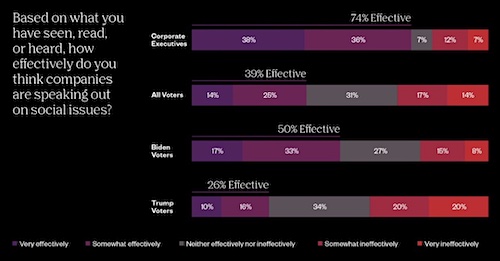Smart companies look before they leap into communicating about social issues.
PR firms that stress the importance of speaking out on social issues may be selling their clients a bill of goods, according to a survey by Brunswick Group.
Conducted by the self-described “critical issues firm,” the report found a huge disconnect between corporate executives and voters when it comes to engagement on social issues.
Less than four in ten (36 percent) of voters “agree unequivocally” that companies should speak out on social matters.
 |
That stands in sharp contrast to the 63 percent of execs who believe the public is anxiously waiting for their words of wisdom. It might be a case of super-inflated egos.
Brunswick notes “the organizational impulse to weigh in on any and every social issue is disregarded by audiences, disconnected from what people want and even diminishing to corporate reputation.”
It warns executives about falling into “The Talking Trap.”
There’s a similar disconnect when it comes to whether a company effectively communicates about social issues.
Nearly three quarters (74 percent) of executives believe their companies effectively speak out on issues.
Only 39 percent of voters agree. Half of Biden voters say companies are effective, while only 26 percent of Trump supporters agree.
The poll’s upshot: executives should think twice or maybe three times before going public on social issues.
Your words may turn off more people than they turn on.
We are shocked that Big Oil resorted to Big PR to improve their environmental image.
Why did PR firms decide to work for the richest corporate clients? As bank robber Willie Sutton used to say, because that’s where the money is.
Published in Climate Change, the Brown paper cites Ogilvy’s work in BP’s classic “Beyond Petroleum” campaign, which sought to “divert attention from the fossil fuel industry to reframe climate change as an issue of individual responsibility.”
The researchers castigated Edelman, which also has come under recent fire for its work for super bad boy ExxonMobil, for representing the American Fuel and Petrochemical Manufacturers and American Petroleum Institute.
Those diligent investigators even found that Greenpeace and the Environmental Defense Fund rely on PR. The environmental groups used DC-area Caplan Communications, winner of a 2006 O'Dwyer Award for PA/Environmental PR.
Of course, the intrepid Brown probers fell into the old false equivalency trap. Big Oil paid Ogilvy, Edelman and the bunch millions over the years. Big Green paid Caplan peanuts.
Big Oil has much to contribute to the public conversation about climate change. PR firms can help make that happen.
Energy companies must engage with the public on the road to a lower carbon future. Robust PR will be needed to fuel the way.


 The techniques deployed by OJ Simpson's defense team in the "trial of the century" served as a harbinger for those used by Donald Trump... People worry about the politicization of medical science just as much as they fret about another pandemic, according to Edelman Trust Barometer... Book bans aren't restricted to red states as deep blue Illinois, Connecticut and Maryland challenged at least 100 titles in 2023.
The techniques deployed by OJ Simpson's defense team in the "trial of the century" served as a harbinger for those used by Donald Trump... People worry about the politicization of medical science just as much as they fret about another pandemic, according to Edelman Trust Barometer... Book bans aren't restricted to red states as deep blue Illinois, Connecticut and Maryland challenged at least 100 titles in 2023. The NBA, which promotes legalized gambling 24/7, seems more than hypocritical for banning player for placing bets... Diocese of Brooklyn promises to issue press release the next time one of its priests is charged with sexual abuse... Truth Social aspires to be one of Donald Trump's iconic American brands, just like Trump University or Trump Steaks or Trump Ice Cubes.
The NBA, which promotes legalized gambling 24/7, seems more than hypocritical for banning player for placing bets... Diocese of Brooklyn promises to issue press release the next time one of its priests is charged with sexual abuse... Truth Social aspires to be one of Donald Trump's iconic American brands, just like Trump University or Trump Steaks or Trump Ice Cubes. Publicis Groupe CEO Arthur Sadoun puts competition on notice... Macy's throws in the towel as it appoints two directors nominated by its unwanted suitor... The Profile in Wimpery Award goes to the Ford Presidential Foundation for stiffing American hero and former Wyoming Congresswoman Liz Cheney.
Publicis Groupe CEO Arthur Sadoun puts competition on notice... Macy's throws in the towel as it appoints two directors nominated by its unwanted suitor... The Profile in Wimpery Award goes to the Ford Presidential Foundation for stiffing American hero and former Wyoming Congresswoman Liz Cheney. JPMorgan Chase chief Jamie Dimon's "letter to shareholders" is a must-read for PR people and others interested in fixing America and living up to its potential... Get ready for the PPE shortage when the next pandemic hits... Nixing Netanyahu. Gaza carnage turns US opinion against Israel's prime minister.
JPMorgan Chase chief Jamie Dimon's "letter to shareholders" is a must-read for PR people and others interested in fixing America and living up to its potential... Get ready for the PPE shortage when the next pandemic hits... Nixing Netanyahu. Gaza carnage turns US opinion against Israel's prime minister. Trump Media & Technology Group sees Elon Musk's X as an option for those who want the free expression promised by Truth Social but without Donald Trump, owner of 57.3 percent of TMTG... Chalk one up for "anti-woke warrior" governor Greg Abbott as University of Texas lays off 60 DEI-related staffers... Five percent of Americans see the US as its own worst enemy, according to Gallup.
Trump Media & Technology Group sees Elon Musk's X as an option for those who want the free expression promised by Truth Social but without Donald Trump, owner of 57.3 percent of TMTG... Chalk one up for "anti-woke warrior" governor Greg Abbott as University of Texas lays off 60 DEI-related staffers... Five percent of Americans see the US as its own worst enemy, according to Gallup.


 Have a comment? Send it to
Have a comment? Send it to 
Dec. 8, 2021, by Joe Honick
According to Financial Times' review of EMBA schools in Europe, the subject of ESG has taken on substantial importance as virtually a required subject. Might be useful to get hold of FT's periodical on schools of management around the world.